Argumentative Essay: Organ Retrieval Ethics in Healthcare - HSLC220
VerifiedAdded on 2023/01/07
|7
|1966
|48
Essay
AI Summary
This essay explores the ethical considerations surrounding organ retrieval from deceased individuals, particularly when faced with objections from loved ones. It delves into the complexities of balancing the potential benefits of organ transplantation with the principles of autonomy, beneficence, and non-maleficence. The essay analyzes the importance of respecting family consent while also considering the potential for saving lives through organ donation. It examines various ethical theories, including deontology, virtue ethics, and utilitarianism, to provide a comprehensive understanding of the moral dilemmas involved in organ retrieval practices. The essay concludes by emphasizing the need for ethical guidelines and protocols that prioritize respect for individual autonomy and informed consent, while also acknowledging the potential for organ donation to benefit society.
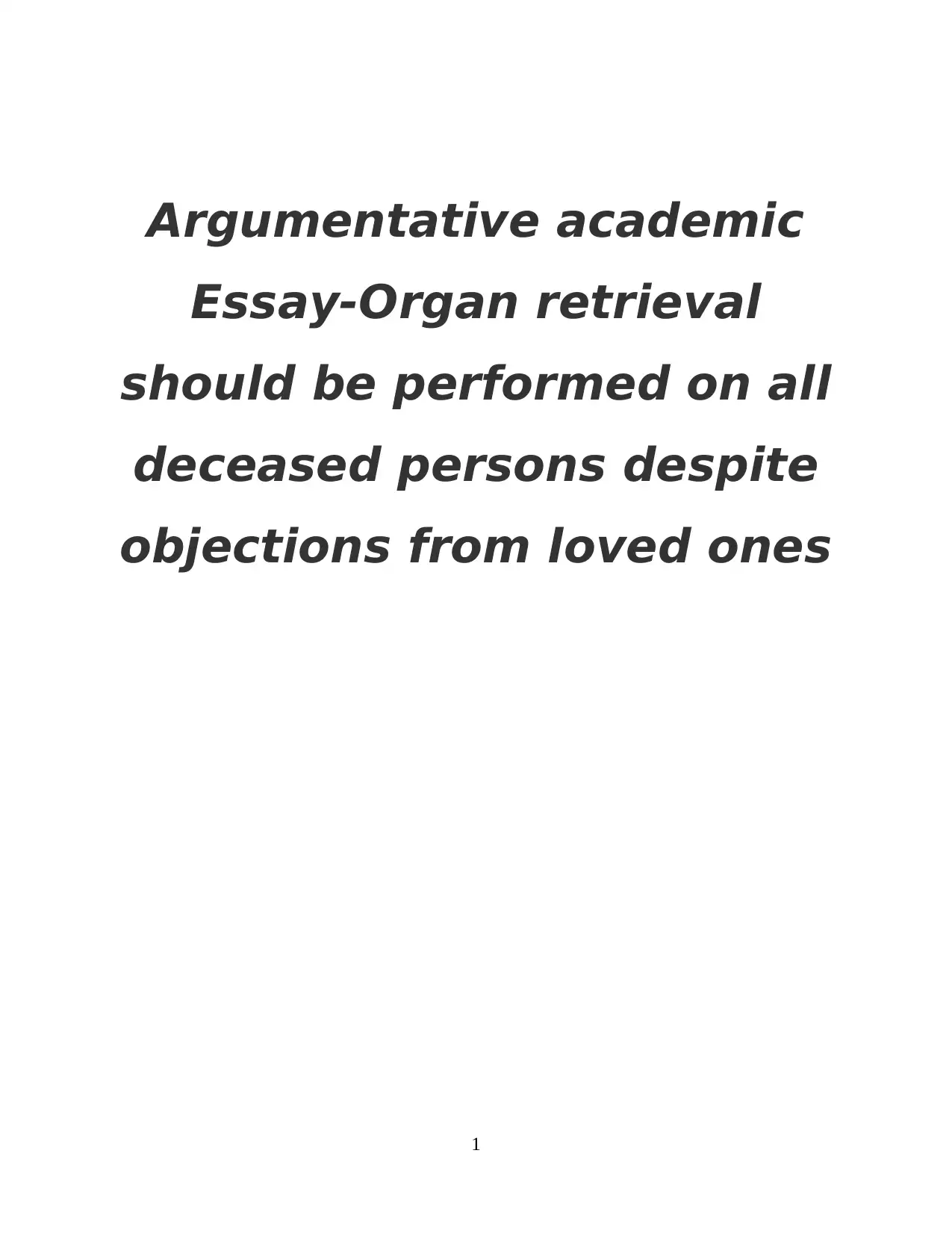
Argumentative academic
Essay-Organ retrieval
should be performed on all
deceased persons despite
objections from loved ones
1
Essay-Organ retrieval
should be performed on all
deceased persons despite
objections from loved ones
1
Paraphrase This Document
Need a fresh take? Get an instant paraphrase of this document with our AI Paraphraser
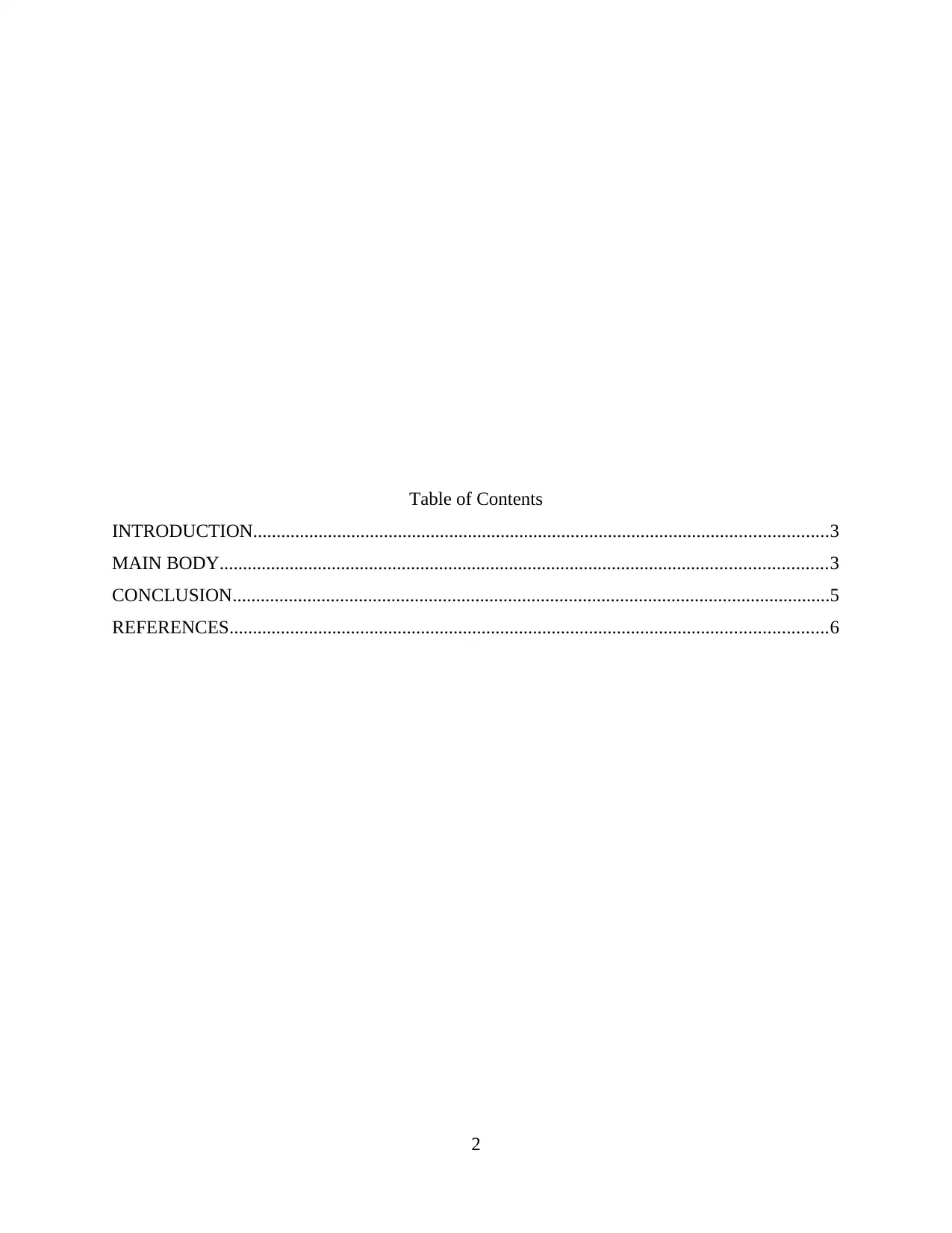
Table of Contents
INTRODUCTION...........................................................................................................................3
MAIN BODY..................................................................................................................................3
CONCLUSION................................................................................................................................5
REFERENCES................................................................................................................................6
2
INTRODUCTION...........................................................................................................................3
MAIN BODY..................................................................................................................................3
CONCLUSION................................................................................................................................5
REFERENCES................................................................................................................................6
2
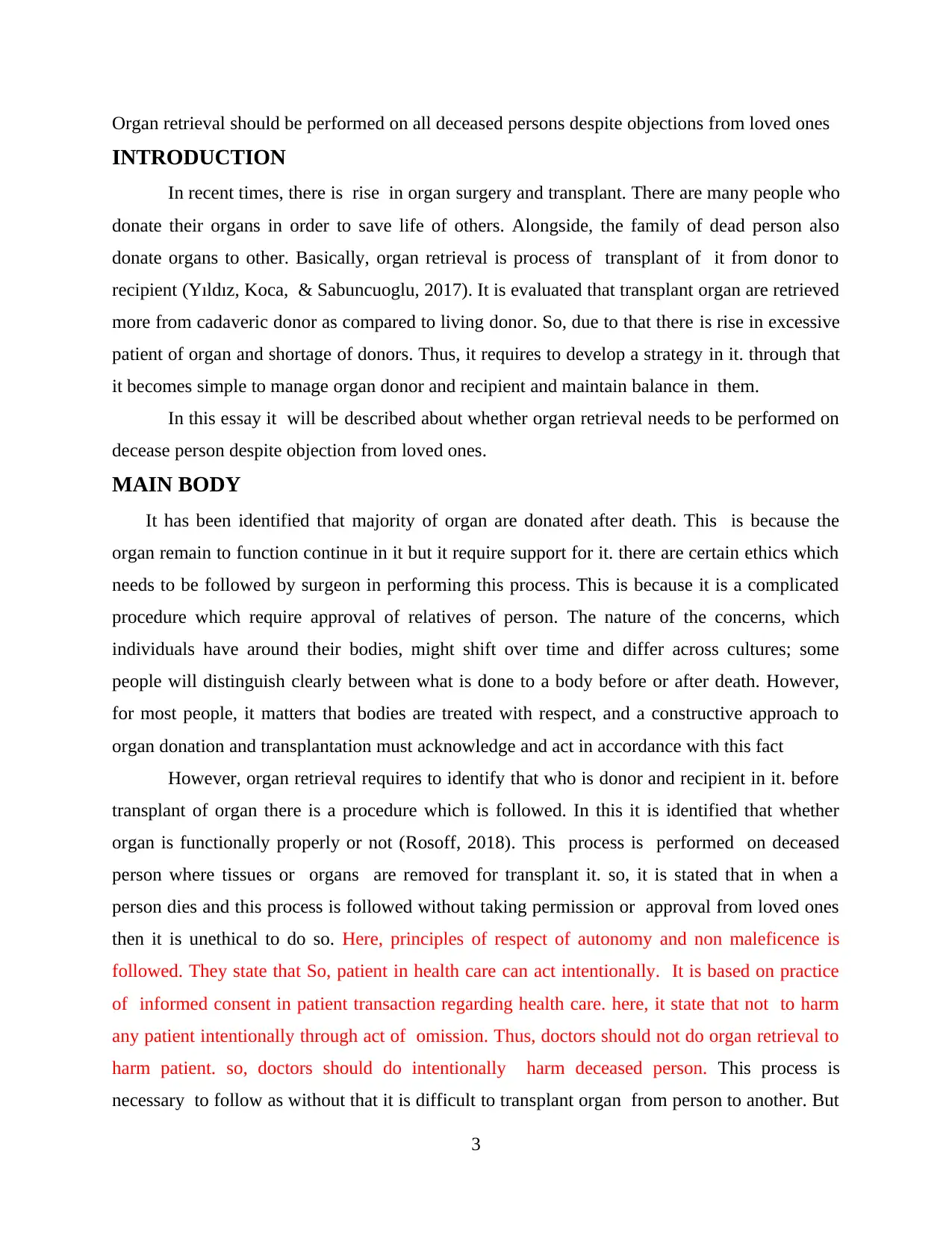
Organ retrieval should be performed on all deceased persons despite objections from loved ones
INTRODUCTION
In recent times, there is rise in organ surgery and transplant. There are many people who
donate their organs in order to save life of others. Alongside, the family of dead person also
donate organs to other. Basically, organ retrieval is process of transplant of it from donor to
recipient (Yıldız, Koca, & Sabuncuoglu, 2017). It is evaluated that transplant organ are retrieved
more from cadaveric donor as compared to living donor. So, due to that there is rise in excessive
patient of organ and shortage of donors. Thus, it requires to develop a strategy in it. through that
it becomes simple to manage organ donor and recipient and maintain balance in them.
In this essay it will be described about whether organ retrieval needs to be performed on
decease person despite objection from loved ones.
MAIN BODY
It has been identified that majority of organ are donated after death. This is because the
organ remain to function continue in it but it require support for it. there are certain ethics which
needs to be followed by surgeon in performing this process. This is because it is a complicated
procedure which require approval of relatives of person. The nature of the concerns, which
individuals have around their bodies, might shift over time and differ across cultures; some
people will distinguish clearly between what is done to a body before or after death. However,
for most people, it matters that bodies are treated with respect, and a constructive approach to
organ donation and transplantation must acknowledge and act in accordance with this fact
However, organ retrieval requires to identify that who is donor and recipient in it. before
transplant of organ there is a procedure which is followed. In this it is identified that whether
organ is functionally properly or not (Rosoff, 2018). This process is performed on deceased
person where tissues or organs are removed for transplant it. so, it is stated that in when a
person dies and this process is followed without taking permission or approval from loved ones
then it is unethical to do so. Here, principles of respect of autonomy and non maleficence is
followed. They state that So, patient in health care can act intentionally. It is based on practice
of informed consent in patient transaction regarding health care. here, it state that not to harm
any patient intentionally through act of omission. Thus, doctors should not do organ retrieval to
harm patient. so, doctors should do intentionally harm deceased person. This process is
necessary to follow as without that it is difficult to transplant organ from person to another. But
3
INTRODUCTION
In recent times, there is rise in organ surgery and transplant. There are many people who
donate their organs in order to save life of others. Alongside, the family of dead person also
donate organs to other. Basically, organ retrieval is process of transplant of it from donor to
recipient (Yıldız, Koca, & Sabuncuoglu, 2017). It is evaluated that transplant organ are retrieved
more from cadaveric donor as compared to living donor. So, due to that there is rise in excessive
patient of organ and shortage of donors. Thus, it requires to develop a strategy in it. through that
it becomes simple to manage organ donor and recipient and maintain balance in them.
In this essay it will be described about whether organ retrieval needs to be performed on
decease person despite objection from loved ones.
MAIN BODY
It has been identified that majority of organ are donated after death. This is because the
organ remain to function continue in it but it require support for it. there are certain ethics which
needs to be followed by surgeon in performing this process. This is because it is a complicated
procedure which require approval of relatives of person. The nature of the concerns, which
individuals have around their bodies, might shift over time and differ across cultures; some
people will distinguish clearly between what is done to a body before or after death. However,
for most people, it matters that bodies are treated with respect, and a constructive approach to
organ donation and transplantation must acknowledge and act in accordance with this fact
However, organ retrieval requires to identify that who is donor and recipient in it. before
transplant of organ there is a procedure which is followed. In this it is identified that whether
organ is functionally properly or not (Rosoff, 2018). This process is performed on deceased
person where tissues or organs are removed for transplant it. so, it is stated that in when a
person dies and this process is followed without taking permission or approval from loved ones
then it is unethical to do so. Here, principles of respect of autonomy and non maleficence is
followed. They state that So, patient in health care can act intentionally. It is based on practice
of informed consent in patient transaction regarding health care. here, it state that not to harm
any patient intentionally through act of omission. Thus, doctors should not do organ retrieval to
harm patient. so, doctors should do intentionally harm deceased person. This process is
necessary to follow as without that it is difficult to transplant organ from person to another. But
3
⊘ This is a preview!⊘
Do you want full access?
Subscribe today to unlock all pages.

Trusted by 1+ million students worldwide
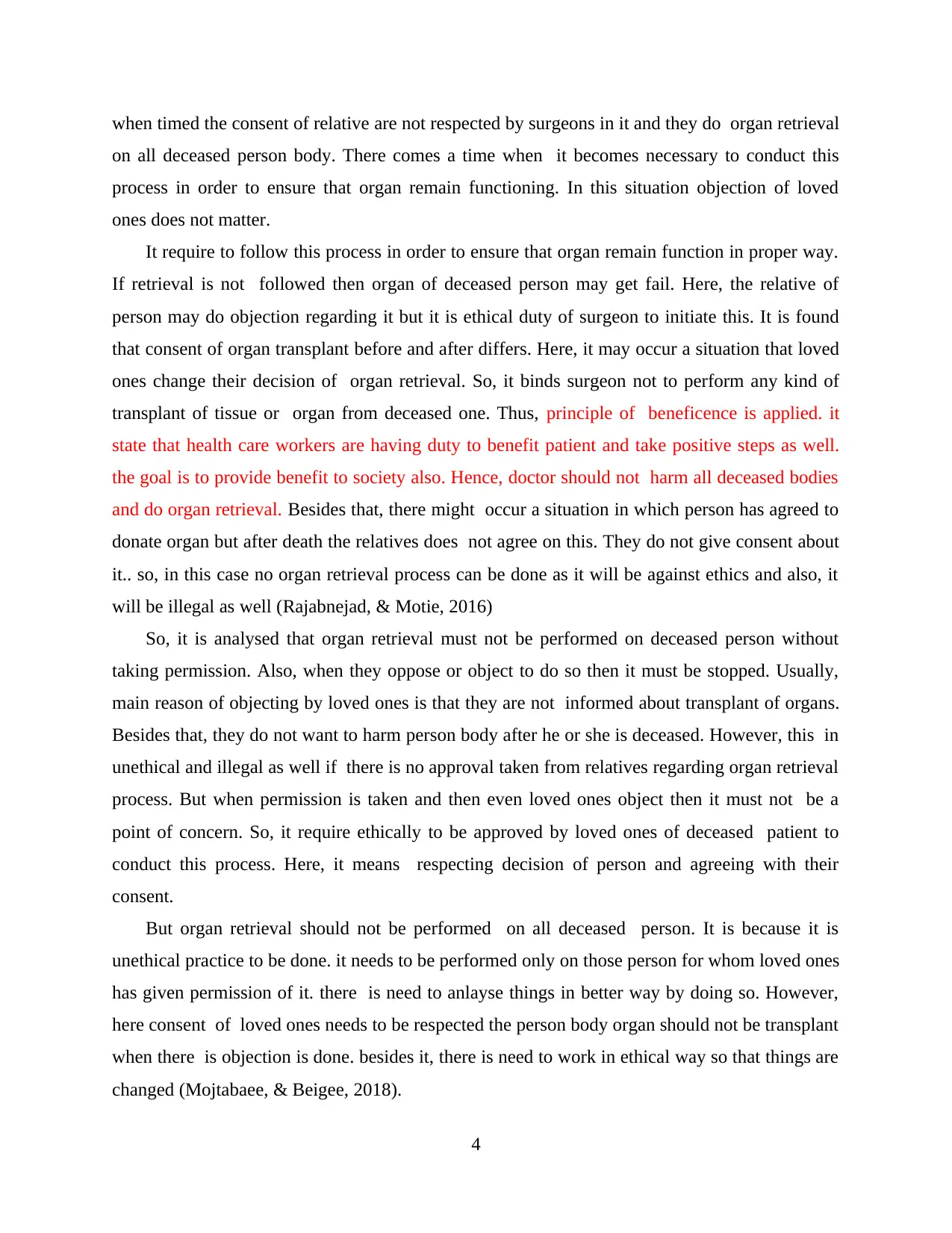
when timed the consent of relative are not respected by surgeons in it and they do organ retrieval
on all deceased person body. There comes a time when it becomes necessary to conduct this
process in order to ensure that organ remain functioning. In this situation objection of loved
ones does not matter.
It require to follow this process in order to ensure that organ remain function in proper way.
If retrieval is not followed then organ of deceased person may get fail. Here, the relative of
person may do objection regarding it but it is ethical duty of surgeon to initiate this. It is found
that consent of organ transplant before and after differs. Here, it may occur a situation that loved
ones change their decision of organ retrieval. So, it binds surgeon not to perform any kind of
transplant of tissue or organ from deceased one. Thus, principle of beneficence is applied. it
state that health care workers are having duty to benefit patient and take positive steps as well.
the goal is to provide benefit to society also. Hence, doctor should not harm all deceased bodies
and do organ retrieval. Besides that, there might occur a situation in which person has agreed to
donate organ but after death the relatives does not agree on this. They do not give consent about
it.. so, in this case no organ retrieval process can be done as it will be against ethics and also, it
will be illegal as well (Rajabnejad, & Motie, 2016)
So, it is analysed that organ retrieval must not be performed on deceased person without
taking permission. Also, when they oppose or object to do so then it must be stopped. Usually,
main reason of objecting by loved ones is that they are not informed about transplant of organs.
Besides that, they do not want to harm person body after he or she is deceased. However, this in
unethical and illegal as well if there is no approval taken from relatives regarding organ retrieval
process. But when permission is taken and then even loved ones object then it must not be a
point of concern. So, it require ethically to be approved by loved ones of deceased patient to
conduct this process. Here, it means respecting decision of person and agreeing with their
consent.
But organ retrieval should not be performed on all deceased person. It is because it is
unethical practice to be done. it needs to be performed only on those person for whom loved ones
has given permission of it. there is need to anlayse things in better way by doing so. However,
here consent of loved ones needs to be respected the person body organ should not be transplant
when there is objection is done. besides it, there is need to work in ethical way so that things are
changed (Mojtabaee, & Beigee, 2018).
4
on all deceased person body. There comes a time when it becomes necessary to conduct this
process in order to ensure that organ remain functioning. In this situation objection of loved
ones does not matter.
It require to follow this process in order to ensure that organ remain function in proper way.
If retrieval is not followed then organ of deceased person may get fail. Here, the relative of
person may do objection regarding it but it is ethical duty of surgeon to initiate this. It is found
that consent of organ transplant before and after differs. Here, it may occur a situation that loved
ones change their decision of organ retrieval. So, it binds surgeon not to perform any kind of
transplant of tissue or organ from deceased one. Thus, principle of beneficence is applied. it
state that health care workers are having duty to benefit patient and take positive steps as well.
the goal is to provide benefit to society also. Hence, doctor should not harm all deceased bodies
and do organ retrieval. Besides that, there might occur a situation in which person has agreed to
donate organ but after death the relatives does not agree on this. They do not give consent about
it.. so, in this case no organ retrieval process can be done as it will be against ethics and also, it
will be illegal as well (Rajabnejad, & Motie, 2016)
So, it is analysed that organ retrieval must not be performed on deceased person without
taking permission. Also, when they oppose or object to do so then it must be stopped. Usually,
main reason of objecting by loved ones is that they are not informed about transplant of organs.
Besides that, they do not want to harm person body after he or she is deceased. However, this in
unethical and illegal as well if there is no approval taken from relatives regarding organ retrieval
process. But when permission is taken and then even loved ones object then it must not be a
point of concern. So, it require ethically to be approved by loved ones of deceased patient to
conduct this process. Here, it means respecting decision of person and agreeing with their
consent.
But organ retrieval should not be performed on all deceased person. It is because it is
unethical practice to be done. it needs to be performed only on those person for whom loved ones
has given permission of it. there is need to anlayse things in better way by doing so. However,
here consent of loved ones needs to be respected the person body organ should not be transplant
when there is objection is done. besides it, there is need to work in ethical way so that things are
changed (Mojtabaee, & Beigee, 2018).
4
Paraphrase This Document
Need a fresh take? Get an instant paraphrase of this document with our AI Paraphraser
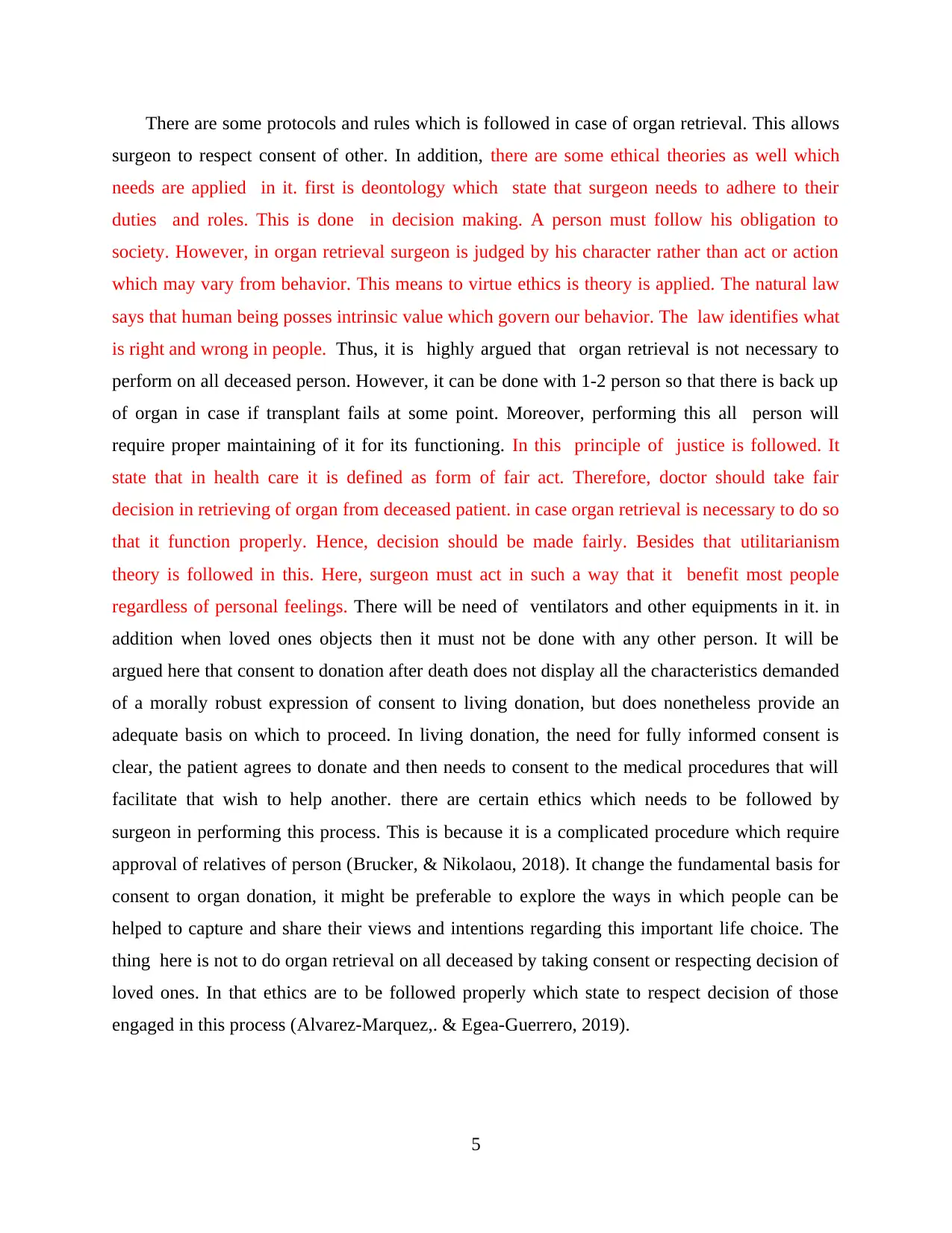
There are some protocols and rules which is followed in case of organ retrieval. This allows
surgeon to respect consent of other. In addition, there are some ethical theories as well which
needs are applied in it. first is deontology which state that surgeon needs to adhere to their
duties and roles. This is done in decision making. A person must follow his obligation to
society. However, in organ retrieval surgeon is judged by his character rather than act or action
which may vary from behavior. This means to virtue ethics is theory is applied. The natural law
says that human being posses intrinsic value which govern our behavior. The law identifies what
is right and wrong in people. Thus, it is highly argued that organ retrieval is not necessary to
perform on all deceased person. However, it can be done with 1-2 person so that there is back up
of organ in case if transplant fails at some point. Moreover, performing this all person will
require proper maintaining of it for its functioning. In this principle of justice is followed. It
state that in health care it is defined as form of fair act. Therefore, doctor should take fair
decision in retrieving of organ from deceased patient. in case organ retrieval is necessary to do so
that it function properly. Hence, decision should be made fairly. Besides that utilitarianism
theory is followed in this. Here, surgeon must act in such a way that it benefit most people
regardless of personal feelings. There will be need of ventilators and other equipments in it. in
addition when loved ones objects then it must not be done with any other person. It will be
argued here that consent to donation after death does not display all the characteristics demanded
of a morally robust expression of consent to living donation, but does nonetheless provide an
adequate basis on which to proceed. In living donation, the need for fully informed consent is
clear, the patient agrees to donate and then needs to consent to the medical procedures that will
facilitate that wish to help another. there are certain ethics which needs to be followed by
surgeon in performing this process. This is because it is a complicated procedure which require
approval of relatives of person (Brucker, & Nikolaou, 2018). It change the fundamental basis for
consent to organ donation, it might be preferable to explore the ways in which people can be
helped to capture and share their views and intentions regarding this important life choice. The
thing here is not to do organ retrieval on all deceased by taking consent or respecting decision of
loved ones. In that ethics are to be followed properly which state to respect decision of those
engaged in this process (Alvarez-Marquez,. & Egea-Guerrero, 2019).
5
surgeon to respect consent of other. In addition, there are some ethical theories as well which
needs are applied in it. first is deontology which state that surgeon needs to adhere to their
duties and roles. This is done in decision making. A person must follow his obligation to
society. However, in organ retrieval surgeon is judged by his character rather than act or action
which may vary from behavior. This means to virtue ethics is theory is applied. The natural law
says that human being posses intrinsic value which govern our behavior. The law identifies what
is right and wrong in people. Thus, it is highly argued that organ retrieval is not necessary to
perform on all deceased person. However, it can be done with 1-2 person so that there is back up
of organ in case if transplant fails at some point. Moreover, performing this all person will
require proper maintaining of it for its functioning. In this principle of justice is followed. It
state that in health care it is defined as form of fair act. Therefore, doctor should take fair
decision in retrieving of organ from deceased patient. in case organ retrieval is necessary to do so
that it function properly. Hence, decision should be made fairly. Besides that utilitarianism
theory is followed in this. Here, surgeon must act in such a way that it benefit most people
regardless of personal feelings. There will be need of ventilators and other equipments in it. in
addition when loved ones objects then it must not be done with any other person. It will be
argued here that consent to donation after death does not display all the characteristics demanded
of a morally robust expression of consent to living donation, but does nonetheless provide an
adequate basis on which to proceed. In living donation, the need for fully informed consent is
clear, the patient agrees to donate and then needs to consent to the medical procedures that will
facilitate that wish to help another. there are certain ethics which needs to be followed by
surgeon in performing this process. This is because it is a complicated procedure which require
approval of relatives of person (Brucker, & Nikolaou, 2018). It change the fundamental basis for
consent to organ donation, it might be preferable to explore the ways in which people can be
helped to capture and share their views and intentions regarding this important life choice. The
thing here is not to do organ retrieval on all deceased by taking consent or respecting decision of
loved ones. In that ethics are to be followed properly which state to respect decision of those
engaged in this process (Alvarez-Marquez,. & Egea-Guerrero, 2019).
5
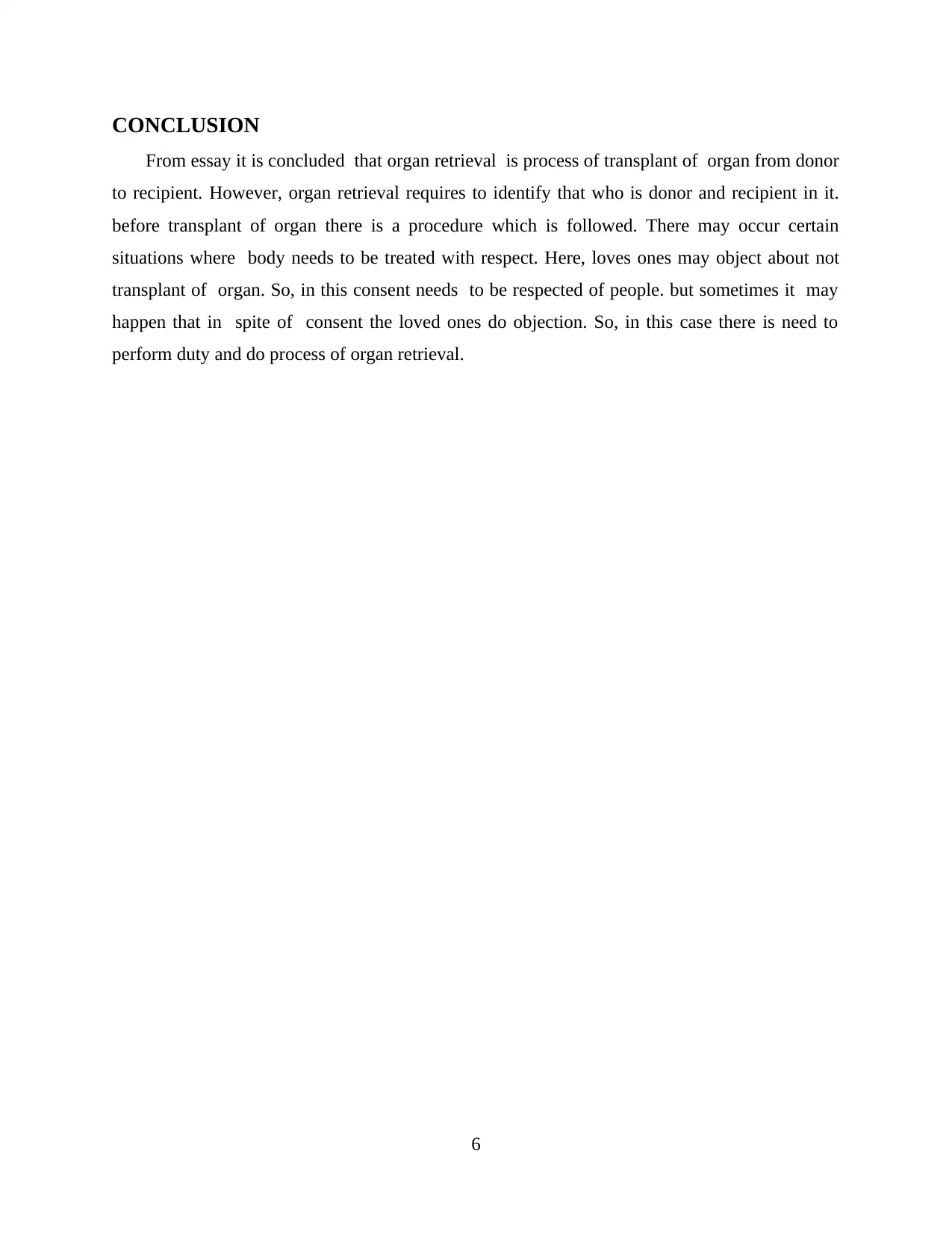
CONCLUSION
From essay it is concluded that organ retrieval is process of transplant of organ from donor
to recipient. However, organ retrieval requires to identify that who is donor and recipient in it.
before transplant of organ there is a procedure which is followed. There may occur certain
situations where body needs to be treated with respect. Here, loves ones may object about not
transplant of organ. So, in this consent needs to be respected of people. but sometimes it may
happen that in spite of consent the loved ones do objection. So, in this case there is need to
perform duty and do process of organ retrieval.
6
From essay it is concluded that organ retrieval is process of transplant of organ from donor
to recipient. However, organ retrieval requires to identify that who is donor and recipient in it.
before transplant of organ there is a procedure which is followed. There may occur certain
situations where body needs to be treated with respect. Here, loves ones may object about not
transplant of organ. So, in this consent needs to be respected of people. but sometimes it may
happen that in spite of consent the loved ones do objection. So, in this case there is need to
perform duty and do process of organ retrieval.
6
⊘ This is a preview!⊘
Do you want full access?
Subscribe today to unlock all pages.

Trusted by 1+ million students worldwide
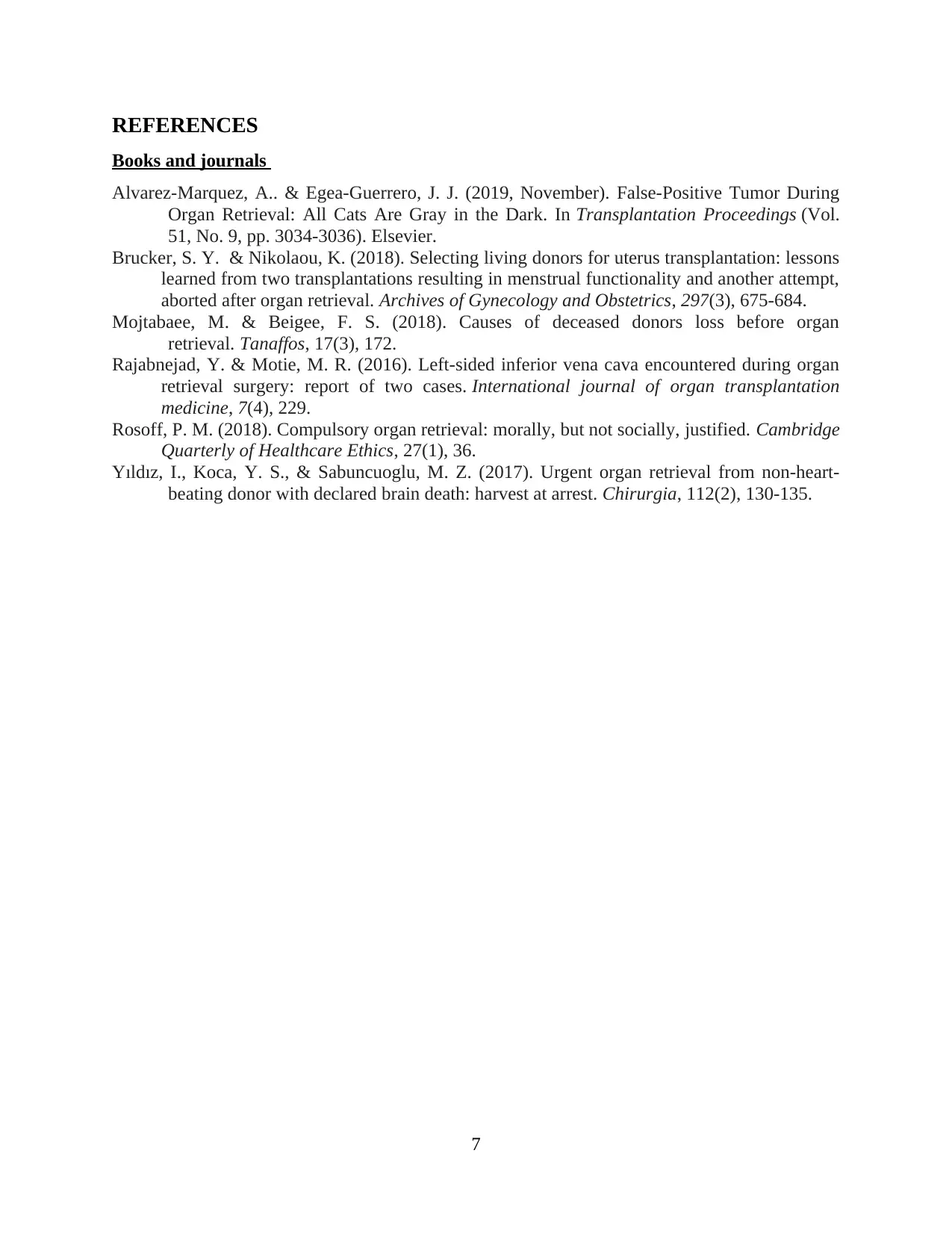
REFERENCES
Books and journals
Alvarez-Marquez, A.. & Egea-Guerrero, J. J. (2019, November). False-Positive Tumor During
Organ Retrieval: All Cats Are Gray in the Dark. In Transplantation Proceedings (Vol.
51, No. 9, pp. 3034-3036). Elsevier.
Brucker, S. Y. & Nikolaou, K. (2018). Selecting living donors for uterus transplantation: lessons
learned from two transplantations resulting in menstrual functionality and another attempt,
aborted after organ retrieval. Archives of Gynecology and Obstetrics, 297(3), 675-684.
Mojtabaee, M. & Beigee, F. S. (2018). Causes of deceased donors loss before organ
retrieval. Tanaffos, 17(3), 172.
Rajabnejad, Y. & Motie, M. R. (2016). Left-sided inferior vena cava encountered during organ
retrieval surgery: report of two cases. International journal of organ transplantation
medicine, 7(4), 229.
Rosoff, P. M. (2018). Compulsory organ retrieval: morally, but not socially, justified. Cambridge
Quarterly of Healthcare Ethics, 27(1), 36.
Yıldız, I., Koca, Y. S., & Sabuncuoglu, M. Z. (2017). Urgent organ retrieval from non-heart-
beating donor with declared brain death: harvest at arrest. Chirurgia, 112(2), 130-135.
7
Books and journals
Alvarez-Marquez, A.. & Egea-Guerrero, J. J. (2019, November). False-Positive Tumor During
Organ Retrieval: All Cats Are Gray in the Dark. In Transplantation Proceedings (Vol.
51, No. 9, pp. 3034-3036). Elsevier.
Brucker, S. Y. & Nikolaou, K. (2018). Selecting living donors for uterus transplantation: lessons
learned from two transplantations resulting in menstrual functionality and another attempt,
aborted after organ retrieval. Archives of Gynecology and Obstetrics, 297(3), 675-684.
Mojtabaee, M. & Beigee, F. S. (2018). Causes of deceased donors loss before organ
retrieval. Tanaffos, 17(3), 172.
Rajabnejad, Y. & Motie, M. R. (2016). Left-sided inferior vena cava encountered during organ
retrieval surgery: report of two cases. International journal of organ transplantation
medicine, 7(4), 229.
Rosoff, P. M. (2018). Compulsory organ retrieval: morally, but not socially, justified. Cambridge
Quarterly of Healthcare Ethics, 27(1), 36.
Yıldız, I., Koca, Y. S., & Sabuncuoglu, M. Z. (2017). Urgent organ retrieval from non-heart-
beating donor with declared brain death: harvest at arrest. Chirurgia, 112(2), 130-135.
7
1 out of 7
Related Documents
Your All-in-One AI-Powered Toolkit for Academic Success.
+13062052269
info@desklib.com
Available 24*7 on WhatsApp / Email
![[object Object]](/_next/static/media/star-bottom.7253800d.svg)
Unlock your academic potential
Copyright © 2020–2025 A2Z Services. All Rights Reserved. Developed and managed by ZUCOL.





